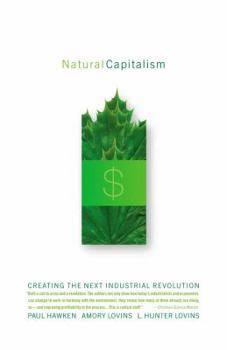Natural Capitalism: Creating the Next Industrial Revolution
Select Format
Select Condition 
Book Overview
This groundbreaking book reveals how today's global businesses can be both environmentally responsible and highly profitable.
Format:Paperback
Language:English
ISBN:0316353000
ISBN13:9780316353007
Release Date:October 2000
Publisher:Back Bay Books
Length:416 Pages
Weight:1.55 lbs.
Dimensions:1.2" x 5.9" x 9.0"
Customer Reviews
4 ratings
Response to review by John A. Matthews
Published by Thriftbooks.com User , 23 years ago
I wish Mr. Matthews had read our book more carefully. Every factual claim he makes is incorrect. The book does mention industrial ecology four times, including the famous Kalundborg example in Denmark. Takeback/producer responsibility laws are also discussed, with specific reference to Japan and with German examples. Although Enron is mentioned in different contexts than he wishes, the chapter on markets does indeed discuss creative ways (many of them invented at Rocky Mountain Institute) to make markets in saved resources. While I fear we did not satisfy Mr. Matthews's preferences for emphasis and ideology, our book does not have the defects he ascribes to it. -- ABL
Is there hope for the future? Yes!
Published by Thriftbooks.com User , 24 years ago
People who care about the ongoing destruction of our environment can get shell-shocked by the relentless tide of bad news. This wonderful book doesn't gloss over our problems, but uses them as a jumping-off point for its central thesis: fixing them need not gut our living standards or depress our economies. On the contrary, it can be a giant opportunity in the finest tradition of capitalism. The book abounds with examples of how enlightened companies have cut resource use and pollution by 75%, 90% or even more--and made money doing it. As one reviewer said: it should be on the night stand of every CEO in the world.
Natural Capitalism Right on the Money
Published by Thriftbooks.com User , 24 years ago
In the summer of 1999, the Harvard Business Review treated the business community to a glimpse of a bold new model for business and industry in the 21st century. The HBR has been filling requests ever since for the article by Amory Lovins, L. Hunter Lovins and Paul Hawken titled "A Road Map for Natural Capitalism." The article described how businesses could profit by employing strategies built around a more productive use of natural resources. The authors explained in a very practical, yet compelling manner how these strategies could go a long way toward solving many current environmental problems.Business readers and anyone concerned about the changing global economy and its impact on the ecosystem will want more than copies of the HBR article once they realize it was actually a tantalizing synopsis of the authors' new book, "Natural Capitalism: Creating the Next Industrial Revolution" (Little, Brown, 1999). This important book can take its place alongside such touchstone volumes as "Future Shock," "Megatrends " and "The New New." The authors describe in vivid detail how business and industry can gain competitive advantage through a new business model based on doing much more with much less.The authors set out to prove that changing realities of the information economy and global competitiveness are already transforming industry and commerce in ways unforeseen even a few years ago. The new business model takes into account the values of all forms of "capital" including human, manufactured, financial, and natural. "Natural Capitalism" starts with an elegantly simple premise: economies need no longer be based on the idea that human capital is finite and natural resources are infinitely abundant when the obvious truth of the 21st Century is exactly the opposite. With mounting confidence, Lovins, Lovins and Hawken predict that the latest industrial revolution will create "a vital economy that uses radically less material and energy." Businesses that recognize the trend toward this new type of industrialism will gain advantage over their less alert competitors. Those that postpone this shift will be left behind and will eventually, make themselves irrelevant in the new economy.Theirs is not merely a detailed updating of Buckminster Fuller's "small is beautiful" thesis. Rather, the authors describe a step-by-step process of business restructuring that should result in more efficiency at the corporate, national and global level. Such a process, if carried out across several industries simultaneously, would make it much easier for governments to promote social equity and conserve or even restore the natural ecosystems reaching across traditional borders.This next stage of industrialism, the authors' "natural capitalism," is founded on four core business strategies already being adopted by the most innovative corporations across the globe. The strategies suggest that companies need to:1) employ technolo
Compliments and Complement
Published by Thriftbooks.com User , 25 years ago
Paul Hawken is an excellent writer, clear thinker and first-rate synthesizer; Amory Lovins is a genius; and Hunter Lovins is a world-class organizer and positive force. So it's not surprising that this team has written a very important, must-read book. Capitalism does have its advantages after all, but as it is currently practiced it will lead us to our collective grave. Fortunately the dynamic trio, shows better ways of doing business. For those of us who aren't CEO sorts (and can't immediately implement the type of innovations Natural Capitalism advocates), yet who still want their financial life to move us in a positive direction, I highly recommend The Mindful Money Guide. This book is an excellent complement to Natural Capitalism as it thoughtfully guides us to a healthier (in all senses of the word) and simpler financial life. It's also very well written.






